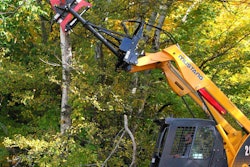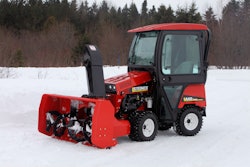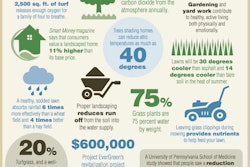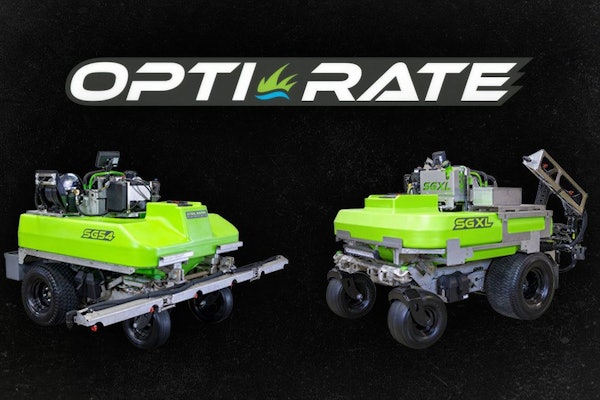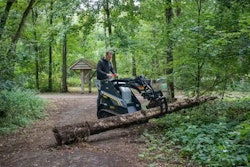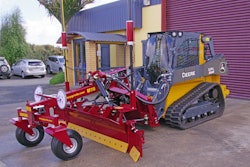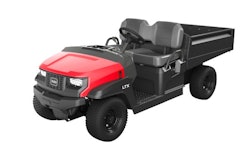 Hustler Turf’s Zeon is an all-electric mower and just one of the alternative fuel options for landscapers to consider.
Hustler Turf’s Zeon is an all-electric mower and just one of the alternative fuel options for landscapers to consider.Photo: Hustler Turf
Whether you’re trying to cut down on fuel costs or you want to create an environmentally friendly company image, finding an alternative fuel for your commercial lawn equipment can be daunting.
The cost of converting your equipment to an alternative fuel source is enough to make some landscapers balk, but don’t underestimate the value of becoming known for taking sustainability seriously.
Mowers consume 1.2 billion gallons of gasoline annually and commercial mowers use more than 100 million gallons of diesel in a year.
Some of the potential benefits of switching to an alternative fuel source are reduced fuel and maintenance costs, extended mower life and diminished fuel spillage and theft.
Biodiesel
Biodiesel is produced from vegetable oils and animal fats. When combined with petroleum diesel it can be used to fuel diesel vehicles without any conversion. B20 is the most popular blend, containing 20 percent biodiesel and 80 percent petroleum diesel.
Biodiesel is non-toxic and biodegradable. It also improves engine operation by raising diesel fuel’s lubricity and combustion quality, according to the U.S. Department of Energy.
Biodiesel does have some drawbacks however. It is known for gelling during the winter and fueling stations are severely lacking. The Department of Energy only list 248 fueling stations, excluding private stations.
Be sure to check with manufacturers of your equipment to determine whether B20 can be used in their products.
Compressed natural gas (CNG)
Natural gas engines produce lower amounts of carbon dioxide and other harmful emissions. And unlike liquid fuels, CNG does not clog fuel systems during seasonal storage. The cleaner fuel also reduces oil-change frequency and extends mower life.
It is the least expensive U.S. motor fuel and almost all of the natural gas consumed in the United States is produced in North America.
To enable adequate mowing time, natural gas must be compressed and stored at high pressure. Dixie Chopper currently offers the CNG-powered Xcaliber Eco-Eagle, which carries a manufacturer’s suggested retail price of $19,685.
Despite its advantages, CNG is not perfect. After all, it’s still a fossil fuel, which means that it is a nonrenewable resource. It also has a lower energy density than gasoline, giving it a limited range.
Electricity
The use of electric power carries some advantages as well – one of the biggest being that it is quiet. What’s more, electric engines require little maintenance compared with gasoline-powered mowers.
Although corded electric mowers are not sensible for commercial use, advances in battery technology have enabled Hustler Turf to create its first all-electric zero-turn radius mower, which can run up to 80 minutes. Meanwhile, Ariens’ AMP Rider offers 75 minutes of continuous mowing.
Steve Popp of Carbon Cutters runs his entire business off of solar power. In 2014 he invested in a $13,600 mower and spent $2,600 on other electric equipment. He charges all of it with his $4,000 solar panels.
The biggest drawback for electric mowers is the question of whether the battery will last long enough to get the larger jobs done. Electric mowers also are more expensive than gasoline-powered mowers.
Propane
Propane is the most widely available alternative fuel in the United States and emits lower amounts of greenhouses gases and harmful emissions than gasoline and diesel engines.
Like CNG, propane cuts down on oil changes and lengthens mower life. It also doesn’t clog or spoil in fuel systems while in storage.
The liquid storage of propane gives it a high energy density, enabling mowers to run on one tank for longer. Landscapers have far more original equipment manufacturer (OEM) mowers designed to use propane than the other alternative fuel sources.
There is also the option of converting current gas mowers to propane mowers. Conversions cost from $1,000 to $3,000. EnviroGard offers both OEM products and performs propane conversions.
The main disadvantage of propane is simply the lack of availability and convenience compared with gasoline, which can be bought on nearly every street corner.
Almost every mower that uses an alternative fuel will cost more up front, but the economic and environmental benefits may be significantly better than a gasoline-powered machine over time.

